China’s Political Discourse: January 2023: A New Year for a New Journey in the New Era
By China Media Project
This monthly report is prepared for Sinocism by the excellent China Media Project.
Introduction - “A new era, a new journey, and new great undertakings” (新时代新征程新伟业)
Concern for China’s Economic Reopening Begins to Outweigh Epidemic Prevention and Control
January Surprises - “China's Anti-Epidemic Achievements Cannot Be Tampered With”
Introduction - “A new era, a new journey, and new great undertakings” (新时代新征程新伟业)
The general tone in the official People’s Daily in January 2023 was about “positive energy,” or zhengnengliang (正能量). A new year had dawned, the first in the wake of the CCP’s “victorious” 20th National Congress, and it promised, “a new era, a new journey, and new great undertakings” (新时代新征程新伟业). This phrase, which first leaped into the headlines in the People’s Daily in late November 2022, appeared in a total of 31 special columns in the month of January.
As the country emerged from December’s wave of infections following the sudden unwinding of “zero Covid, and as transport picked up the pace and consumption patterns returned, January was a time for official Party media to recap the victories achieved over the past three years. Aside from the talk of “great undertakings,” the People’s Daily was full of words like “confidence” (信心), which appeared in 58 January headlines, “vitality” (活力), which appeared in 27, and “stability” (稳), which appeared in 18.
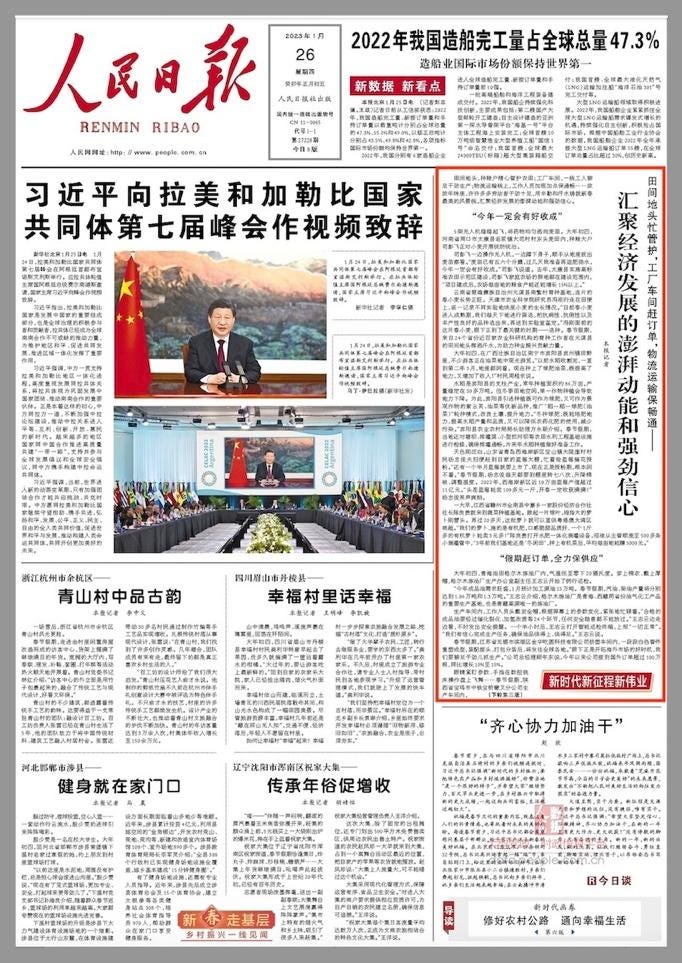
The dramatic rollback of Covid restrictions, the focus of the last discourse report, continued in January 2023. On January 30, State Council's Joint Prevention and Control Mechanism Comprehensive Team announced that cases had declined steadily across the country. Though no final victory had been declared by the end of the month, it seemed to many that this was the beginning of the end. Still, “epidemic prevention and control” (疫情防控) was not completely out of the picture, and the phrase remained at the top of the CMP scale in Tier 1 in January, joining just two other terms — “the 20th CCP National Congress” (二十大) and “high-quality development” (高质量发展).
Generally, however, there was a shift in the focus of China’s Party-state media away from the theme of Covid prevention, and to the new theme of economic recovery. Our focus topics for January 2023 take a closer look at the shift of the official narrative, and the structured propaganda campaigns that constructed this narrative.
Focus Topics: Xi Jinping, Front and Center in Term Three
Xi Jinping's securing of a third term at the 20th National Congress in October 2022 marked a formal break with the system of term limits put in place by previous generations of CCP leaders in the reform era — and undone by Xi in the wake of the 19th National Congress in 2017. In this sense, January was truly the beginning of a new era of concentrated CCP leadership. And Xi’s centrality, though hardly a surprise, was telegraphed in the layout of the first 2023 edition of the People’s Daily, shown below.
Over the past five years, the front page of the January 1 edition of the People’s Daily has been quite consistent in its layout, including both the text of Xi Jinping's New Year’s Address and coverage of the annual New Year Tea Party hosted by the Chinese Political Consultative Conference (CPPCC), China’s political advisory body. In January 2022, these two items had roughly even real estate on the front page of the CCP’s flagship newspaper. This year, however, Xi Jinping’s New Year’s Address occupied at least 30 percent more space, allowing for a much larger portion of the actual address.
For the first time, the CPPCC New Year Tea Party disappeared entirely from the front page, having been pushed to the previous day’s edition, the last of 2022. The space ordinarily dedicated to the Tea Party was instead occupied by a series of responses to Xi’s New Year’s Address, notably elevating the sense of its importance. These included an item announcing the publication in the official CCP journal Seeking Truth of Xi’s speech to the First Plenum of the 20th CCP Central Committee, “Uniting and Struggling to Achieve the Goals and Tasks of the 20th Congress” (为实现党的二十大确定的目标任务而团结奋斗); a response to the New Year Address by the People’s Daily commentary team, “Today's China Is a China Where Dreams Continually Come True” (今天的中国,是梦想接连实现的中国); and two further response pieces written by the People’s Daily and Xinhua. These were “The Dreamers in the [General Secretary’s] Address” (贺词里的追梦人) and “Making Tomorrow's China Even Better” (让明天的中国更美好).
These layout choices iterated Xi’s status as the one and only center, while the dreamy, hopeful triumphalism of the coverage set the tone for the month and year to come. Meanwhile, the second page of the paper was a nod to the glorious past — a library of inspirational quotes from Xi Jinping's previous New Year Addresses, going back over the past decade.
As a brief aside on foreign policy, it is interesting to note that the People’s Daily rang in the New Year alongside Russia. Immediately to the right of the paper’s masthead, known as the “newspaper eye,” or baoyan (报眼), was an article about New Year’s greetings exchanged between Xi Jinping and Vladimir Putin. It noted that “[on] behalf of the Chinese government and the Chinese people, Xi Jinping extended his sincere congratulations and best wishes to President Putin and the Russian people,” and said that he was prepared to “lead the two sides to deepen comprehensive strategic cooperation and practical cooperation in various fields for the benefit of both countries and peoples.” The article made no mention of Russia’s invasion of Ukraine, and referred to 2022 only as “an extraordinary year” with a "rapidly evolving international situation."
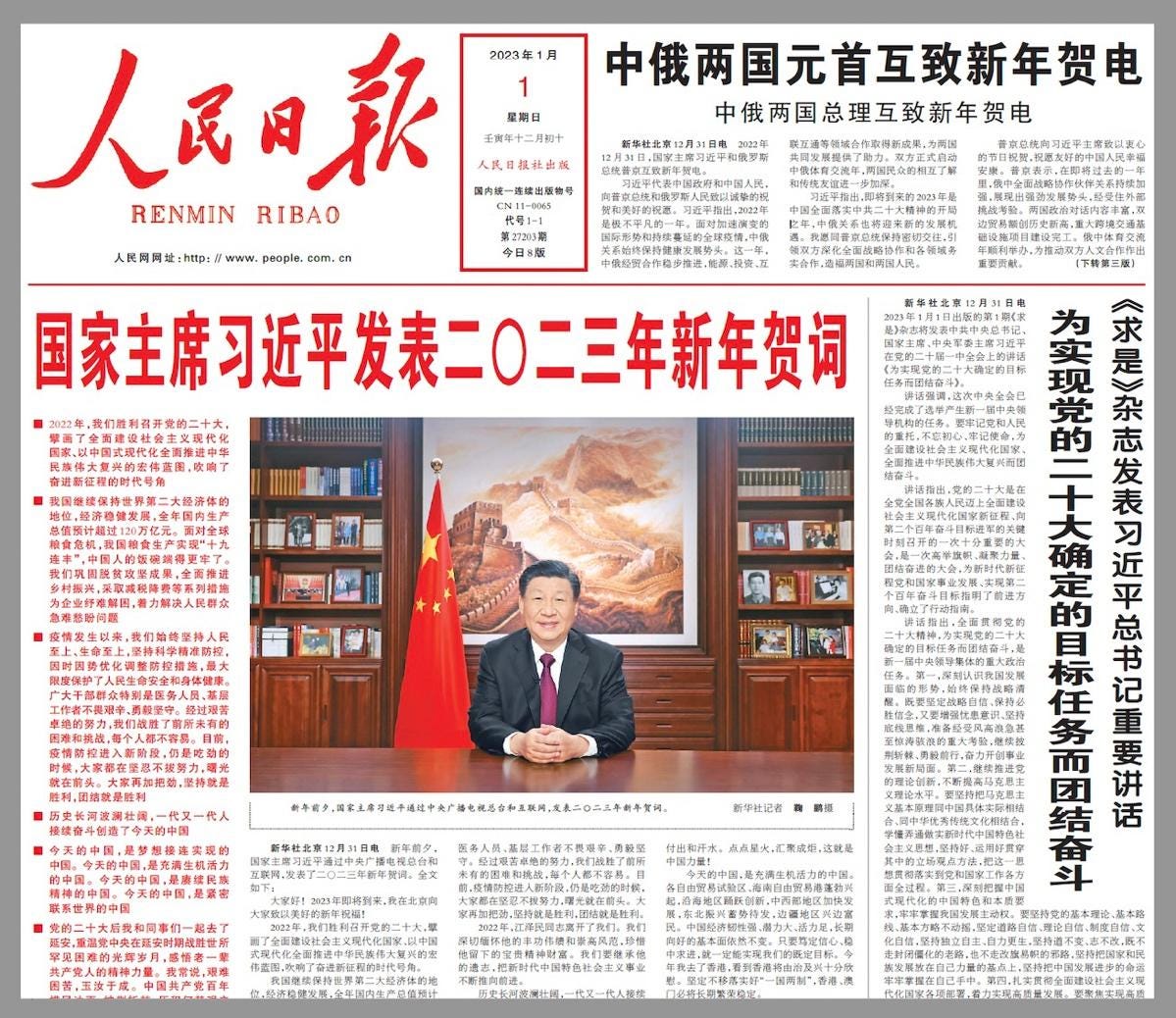
Concern for China’s Economic Reopening Begins to Outweigh Epidemic Prevention and Control
The shift to the new central theme of economic recovery in January could be seen particularly in eight commentaries attributed to "Zhong Yin" (仲音), a pseudonym for important pieces representing the prevailing view of the central leadership that is a homophone for “important voice” (重要声音). Half of these high-level commentaries were defenses of China’s decision in December to downgrade Covid to a Class B infectious disease, a continuation of the rationalization of the dramatic change in epidemic policy CMP discussed in detail in the last monthly report.
But another strong theme was economic recovery and social stability. On January 4, a “Zhong Yin” commentary called “Striking a Comprehensive and Balanced Approach, Strongly Maintaining Economic and Social Stability” (统筹兼顾,有力保持经济社会大局稳定) argued that the leadership had managed over the past three years to “coordinate” the priority of “epidemic prevention and control” (one of January’s 3 Tier 1 terms) and “economic and social development.” The commentary was part of a broader effort in official propaganda to downplay and rationalize the dramatic economic effects of Xi Jinping’s “zero Covid” policy, suggesting that the hardships suffered by the people were necessary and measured costs, considering “scientifically” by the leadership in an effort to save lives. “Judging the general situation, setting the direction, acting at key times, and applying force on the most critical matters, we minimized the epidemic's impact on economic and social development,” the commentary read.
The underlying message was that the CCP had managed through its policies to ensure “general economic and social stability” (经济社会大局稳定) and that it was now time to move on with the core business of development. “A 'smooth transition' is a requirement for both public health and economic operations," it said.
It is difficult to know the extent to which rare street protests against “zero Covid” in Shanghai and other cities in late November 2022 drove the leadership’s rapid moves in December to roll back restrictions. But the protests certainly reflected the widespread anger in society caused by painful Covid policies that exceeded the threshold of what the majority of people could tolerate, particularly as they witnessed life returning to normal outside of China. The messages in official propaganda in January were pitched in response to this anger, sending the message that the leadership was working to ensure that domestic needs were being met (including access to health care and key supplies, an urgent concern in December), that production and consumption were returning to normal, and that international exchanges and business — severely interrupted by three years of harsh Covid restrictions — were now being reinvigorated.
Offering reassurance on China’s economic strength, the January 4 “Zhong Yin” commentary quoted “the CEOs of eight large multinational companies” as saying the German newspaper Frankfurter Allgemeine Zeitung, “We are convinced that China will maintain its fundamental growth momentum," adding that the remarks from these executives reflected “the enduring confidence of foreign investors in the Chinese market and the huge potential of the Chinese market.” The remarks, in fact, had come from an article printed in the German paper nearly two months earlier, on November 10, 2022, and were a response by a small number of German executives to a growing emphasis in Europe over the past few years on “system rivalry” with China, and concerns over what German Chancellor Olaf Scholz called “one-side dependencies.” The Frankfurter Allgemeine Zeitung editorial was as much a reflection of growing unease over China as a sign of business confidence — but it was widely cited in Chinese state media to encourage stronger economic and business relations.
Despite the wishful thinking in the People’s Daily, China’s international re-connection was hobbled in January as a number of countries, including South Korea, Japan, India, Italy and Morocco, announced various restrictions on travelers from China, citing the country’s surge in Covid cases through December. Even as China reported in late January that Covid cases had peaked, South Korea extended its travel rules through the Lunar New Year holiday. These restrictions came along with continued discussion in international media of China’s “Covid failure,” extending coverage in December in many outlets that questioned the competence of Xi Jinping’s governance in light of an apparently out-of-control situation. Michael Schuman, a Beijing-based contributor to The Atlantic, had written that “the rapid reversal [of the ‘zero Covid’ policy] also raises serious questions about how well governed China actually is.”
Tackling these logistical and reputational hurdles to China’s full re-integration with the world economy rapidly became another major objective in the Party-state media. State media reports in January continued the defense mounted in December 2022 against criticism of the rapid unwinding of Xi’s “zero Covid” policy, and China’s apparent lack of preparedness.
Several January commentaries in the People’s Daily by "Zhong Sheng" (钟声), a penname used by the newspaper’s International Department, struck back aggressively at criticisms of China’s handling of Covid. The first of these, a commentary on January 4, was a full-fledged attack on “some Western media,” which had “deviated from the spirit of science, maliciously smeared China's anti-epidemic policy adjustment, [and] completely abandoned professional media conduct.” Criticism of China’s policies, it suggested, exposed a “deep-rooted political bias.” The commentary argued — in the face of widespread reports of shortages of medical supplies and services — that the government had “organized hundreds of key enterprises” to ensure sufficient medical supplies, and had “deployed these precisely according to the peak of the epidemic.”
The list of “Zhong Sheng” commentaries in January gives the full flavor of the criticisms leveled against criticisms:
January 4, 2023, “Full Exposure of Deep-Rooted Political Prejudices” (根深蒂固政治偏见的充分暴露)
January 8, 2023, “Ignoring China's Contribution to the Fight Against the Epidemic Is Irresponsible to History” (无视中国抗疫贡献是对历史的不负责任)
January 9, 2023, “Fallacies Will not Change the International Community's Confidence in China's Economic Development” (谬论改变不了国际社会对中国经济发展的信心)
January 17, 2023, “Politicizing Epidemic Prevention and Control to the Detriment of Others” (将疫情防控政治化损人不利己)
January 19, 2023, “China's Optimized Prevention and Control Measures Is Fighting a Prepared War” (中国优化防控举措,打的是有准备之仗)
January 20, 2023, “Ignoring China's Contribution to the Fight Against the Epidemic for Three Years Exposes Ignorance and Prejudice” (无视中国三年抗疫贡献暴露无知和偏见)
The villain in nearly all of these commentaries was “certain Western media” (一些西方媒体) and “various Western media” (个别西方媒体) who acted with “ulterior motives” (别有用心) — this last term a familiar CCP trope used for decades to attack perceived political enemies, as in the case of the political persecution in the early 1950s of the Marxist literary theorist Hu Feng (胡风).
In addition to responding to international criticism with harsh words, Party-state media made an effort to showcase support in the international community for China's Covid policy and its effectiveness, as well as voice urgent expectations for China’s full return to the world economy.
In January, the People's Daily ran six articles in a special series called “International Perspectives on China's Optimization of Epidemic Prevention and Control Measures” (国际社会看中国优化疫情防控措施). The articles essentially handpicked quotes from foreign politicians, experts, and scholars that seemed to endorse China’s policy shift, and express optimism about the Chinese economy and its global role. Many of these continued with the language covered in the last CMP monthly report, about the “scientific” and “rational” nature of policy changes. The articles were as follows:
January 5, 2023, "Putting People's Lives, Safety and Physical Health First" (把人民群众生命安全和身体健康放在第一位)
January 6, 2023, "China's Prevention and Control Policies Are Scientific and Effective" (中国的防控政策科学有效)
January 7, 2023, "Clearing the Epidemic Haze with the Power of Unity" (用团结的力量扫除疫情阴霾)
January 9, 2023, “Global Tourism Markets Focus on China's Relaunch of Outbound Travel” (全球旅游业市场关注中国重启出境游)
January 14, 2023, "New Impetus for the World Economy" (为世界经济注入新动力)
January 16, 2023, “China Effectively Integrated Epidemic Prevention and Control with Economic and Social Development” (中国统筹疫情防控和经济社会发展卓有成效)
These articles were essentially lists of quotes from foreign experts, betraying a long-held obsession in the Party-state media with foreign voices — somewhat ironically now, one might say, given Xi Jinping’s insistence on raising the power of “China’s voice” — as perhaps the most authoritative defenders of the CCP and its actions. But beyond the piling up of quotes, the headlines were intended as direct messages to readers, written as straightforwardly as possible so that no one could miss their implications as they were splashed across internet portals, state media websites, and government platforms as well as social media.
In the second half of January, the People's Daily published another six articles in its “International Forum” (国际论坛) section that served the same purpose, delivering simple headlines that sought to boost “positive energy” about China’s Covid policies of the past three years, and about the strength of its economy. These were: “China's Epidemic Prevention Policy Boosts Confidence in Global Growth” (中国调整防疫政策提振全球经济增长信心); “China's Epidemic Prevention and Control Policy Has Stood the Test of History” (中国的疫情防控政策经得起历史检验); “China Has Made an Important Contribution to the Global Fight Against the Epidemic” (中国为全球抗疫作出重要贡献); “China's Economy Shows Strong Resilience” (中国经济展现强大韧性); and “China's Economic Development Has Multiple Advantages” (中国经济发展具有多重优势).
These articles barely scratched the surface of the thick patina the People’s Daily and other state media painted over China’s Covid legacy and economic story in January. As the leadership laid it on thick with “positive energy,” there was also the choice headline: "The Most Exciting Economic Growth Story Comes From China" (最令人激动的经济增长故事来自中国). The commentary quoted sources from Cuba, Germany, Cambodia, Spain and the UK, all bullish about China’s prospects. China was ready, it said, to “provide sustained impetus to the recovery and growth of the world economy.” But this would require the positivity of all partners. “Whether it is to deal with the immediate crisis or to create a better future, humanity needs to be in the same boat, united and cooperative,” it said.
January Surprises
“China's Anti-Epidemic Achievements Cannot Be Tampered With”
On January 1, the Chinese Embassy in France published an article under the headline “China's Anti-Epidemic Achievements Cannot Be Tampered With" (中国抗疫成果不容抹黑篡改) that sharply criticized French media coverage of the shift in China's epidemic policy, casting it as ill-intentioned hype misleading perceptions of China.
The embassy article alleged five major fallacies in the French media perspective: 1) "China's epidemic is out of control"; 2) "China's vaccines are ineffective"; 3) "China has imprisoned people for three years"; 4) "the dynamic zero policy has failed"; and 5) "China's epidemic data is distorted."
But as the Shanghai-based nationalist news site Guancha Syndicate (观察网) shared the embassy article on Weibo, it had the opposite of the intended effect among readers, many of whom felt that the so-called fallacies in the embassy account were actually factual descriptions neatly summarizing everything that had gone wrong in China, accurate and to the point.
The result in the article’s comment section at Guancha Syndicate was a phenomenon known in Chinese as “overturning the cart” (翻车), in which the intended takeaway was completely undermined. “Why stress over five truths?” one comment asked. “Thanks for the summary,” another said. Eventually, Guancha.cn had to disable the comment section, curating it to ensure that the messages remaining were in line with the intended effect. In the end, just six of the 13,000 comments made to the article were shown.
By the middle of January, six "Zhong Sheng" (钟声) commentaries in the CCP’s official People’s Daily newspaper had echoed the embassy article, attacking the Western media for “disregarding the truth and turning their backs on the spirit of science.” But the backfire at Guancha Syndicate had already underlined the perils of such propaganda against the backdrop of recent experiences, and in light of deeply held, if no longer openly expressed, objections to China’s strict lockdown policies.
Mass PCR Testing, So 2022!
On January 24, the local command center for Covid control and prevention in Dongxiang, a district under the city of Fuzhou in the southern province of Jiangxi, issued a notice through its official WeChat account, “Dongxiang Release” (东乡发布), informing the public that free PCR testing would be carried out throughout the district from January 25-26.
The notice suggested the move was being taken because “those returning to their hometowns were quite numerous” and “the health and safety of our city resident friends [should be] protected.” But the backlash was swift. Comments on social media took local authorities to task for their apparent disregard for national policies relaxing the approach to Covid, including mandatory testing guidelines. One user quipped: “What, is Jiangxi starting its own new dynasty?” Asked another: "Isn’t this practice against the national policy?"
"They’re still living in 2022."
A January 24, 2023, posted to the WeChat account “Dongxiang Release” announces free PCR testing in the district.
At around 5 PM on the same day, "Dongxiang Release" deleted the information about free PCR testing and issued a public apology. The apology said that owing to “work considerations not being fully made,” members of the public had been “distressed” (困扰) by the original notice. “At present, our district is smoothly handling the current round of peak infections, and in the next step will carry out epidemic prevention and control work in strict compliance with relevant national demands,” it said.
The Hot and the Cold
About the Scale: According to the discourse scale developed by CMP in 2016, based on a historical analysis of keywords appearing in the China Communist Party’s flagship People’s Daily newspaper, we define a six-tier system of discourse intensity based on the total number of appearances of a given discourse term on a per article basis for the full year in the paper. The scale is as follows:
In 2021, CMP adjusted its classification method for CCP discourse, determining the intensity (热度) of Party terminologies according to the absolute number of articles including those terms in the People's Daily newspaper. Previously, CMP used a proportional method, which looked at the number of articles including a particular catchphrase (提法) as a ratio of total articles in the newspaper over a given period. Our monthly classification standard, based on the six-level scale created in 2016, is as follows:
In January 2023, one of the top performers in the official CCP discourse was the phrase “high-quality development” (高质量发展), which maintained its position at the top of the CMP scale in Tier 1. As the official discourse shifts away from a focus on Covid control measures to economic development and related social issues, “high-quality development” deserves more specialized attention.
“High-quality development” was first introduced by Xi Jinping‘s political report to the 19th National Congress of the CCP in October 2017, in which he said, "China's economy has shifted from a stage of high growth to a stage of high-quality development" (我国经济已由高速增长阶段转向高质量发展阶段). The phrase appeared just once in Xi’s political report that year, but its continued use in the People’s Daily from October 31, 2017, and in other official media outlets, ensured its central role as a catchphrase in what the CCP defined as a new stage of development.
The original People's Daily article using the phrase "high-quality development" characterized the concept essentially as an "emphasis on quality rather than speed, and development rather than growth" (强调质量而非速度,强调发展而非增长). Or, in the words of Zheng Xinli (郑新立), executive vice-president of the China Center for International Economic Exchanges, a government-run think-tank: "The essential meaning of the idea of 'shifting to high-quality development' is that China's economy is transitioning from sloppy high-speed growth — achieved mainly by increased consumption of material resources — to intensive growth achieved mainly by technological progress, improved management and higher quality of labor.”
The CCP has continually emphasized that “high-quality development” is more “people-centered,” focused on more direct benefits — as opposed to the indirect benefits of the previous model, which held that GDP growth would ultimately raise the living standards of all. “High-quality” would mean, at least in theory, that everyone would share in the fruits of economic growth and activity, and the focus would be on tangible benefits such as better education, medical services, living conditions, and so on.
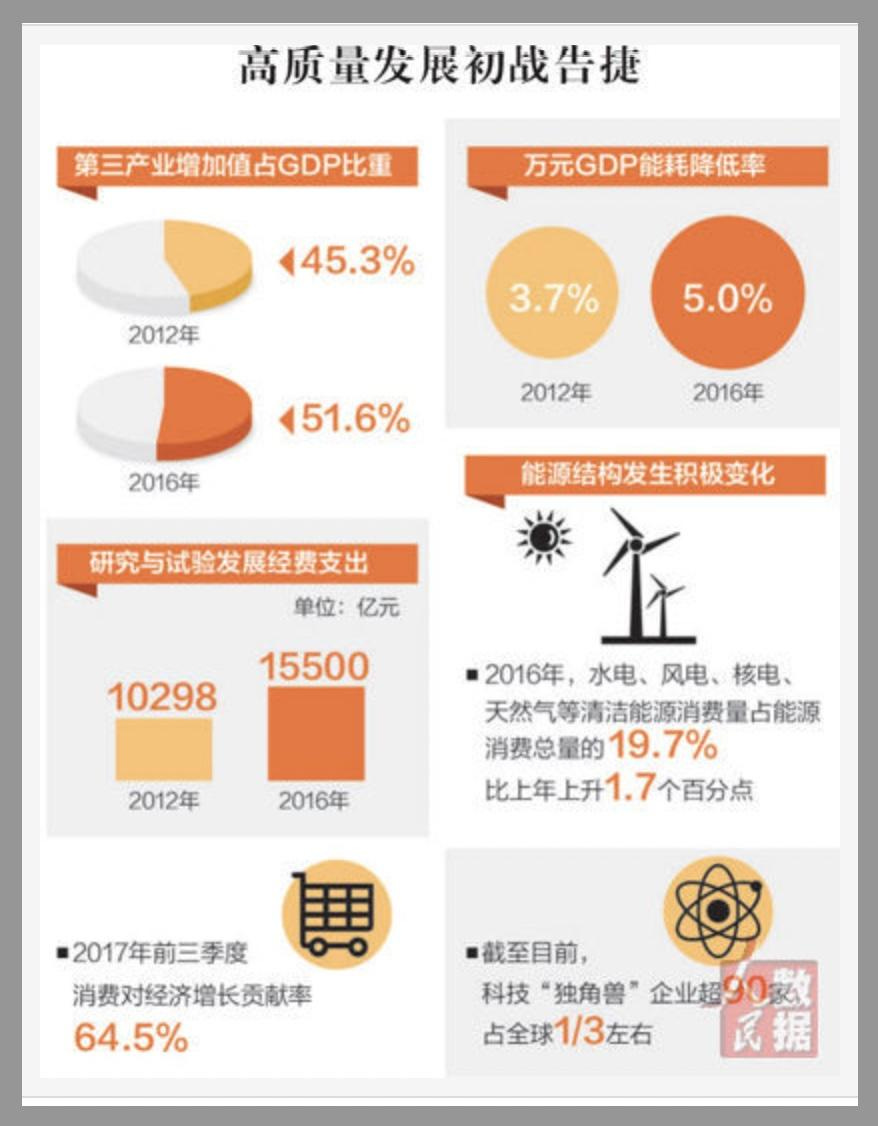
By March 2018, as the first National People’s Congress (NPC) was held in the wake of the 19th National Congress (and term limits formally removed for Xi Jinping), “high-quality development” had become a “hot word,” as the government’s official China Daily reported.
“High-quality development” appeared with high frequency in the People’s Daily throughout 2022, leading up to the 20th National Congress and Xi Jinping’s second political report, where the phrase appeared 14 times — a true coming of age. Language in the third section of the report, laying out the mission and tasks of the Party, placed “high-quality development” at the core of another emerging concept, “Chinese-style modernization,” right alongside the rule of the CCP:
The essence of Chinese-style modernization is adherence to the leadership of the Chinese Communist Party, adherence to socialism with Chinese characteristics, and achieving high-quality development . . . .
The phrase, which defines a new direction for China’s economic social development — and also, importantly, bears Xi Jinping’s imprimatur — seems set to continue as an important concept through to the next National Congress.
Also at the top of the CMP scale in Tier 1 in January 2023 was the phrase “epidemic prevention and control” (疫情防控). However, the phrase was clearly outperformed at the top by the phrases “20th National Congress” and “high-quality development.” The priority at the start of the new year, and in the wake of the 20th National Congress, was clearly the study of the “spirit” of Xi Jinping’s political report, the making of related resolutions, and the reinvigoration of the economy.
In all likelihood, “epidemic prevention and control” will continue to fade as a phrase of importance in the coming months, appearing primarily as a marker of China’s past policies and actions as it claims “decisive victory” (as it did on February 17).
Readers of the December 2022 report may note that the number of phrases at the top of the CMP scale has diminished. In all, six phrases dropped down from Tier 1 to Tier 2 for the month, including: “with Comrade Xi Jinping as the core” (以习近平同志为核心); “COVID-19”(新冠肺炎); “comprehensively building a modern socialist nation” (全面建设社会主义现代化国家); “since the 18th National Congress of the CCP” (十八大以来), “Belt and Road” (一带一路); and “Chinese path to modernization” (中国式现代化).
What accounts for these changes?
In fact, all except “COVID-19,” diminishing as a result of the change in the pandemic situation and China’s response, can be explained by the rise of another key phrase, “20th National Congress” (二十大). This phrase can be regarded as an umbrella term that subsumes all of the others. In other words, notions of Xi as the “core,” his legacy “since the 18th National Congress,” and so on, can be pulled along behind the engine of the 20th National Congress. And so we find them in January in Tier 2.
None of the various permutations of Xi Jinping’s banner phrase for specific policy areas performed above Tier 4 in January. “Xi Jinping Thought on Ecological Civilization” (习近平生态文明思想), Xi’s catchphrase for environmental policy and sustainable development, dropped again from Tier 3 to Tier 4. “Xi Jinping Thought on a Strong Military” (习近平强军思想), relating to national security, rose modestly from Tier 5 to Tier 4. Both “Xi Jinping Economic Thought” (习近平经济思想) and “Xi Jinping Thought on Rule of Law” (习近平法治思想) dropped from Tier 4 to Tier 5. As has often been the case, “Xi Jinping Thought on Diplomacy” (习近平外交思想) lagged behind the others. The phrase remained at the bottom of the CMP scale at Tier 6 in January.
The “Two Establishes” (两个确立), a crucial phrase over the past year in signaling the legitimacy of Xi Jinping’s rule, remained in Tier 2, joined by the phrases in the so-called “442 formula,” all of which also play an important role in firming up Xi’s position as the “core” leader. These terms, which experienced some ups and downs through the spring, include the “Four Consciousnesses” (四个意识), the “Four Confidences” (四个自信), and the “Two Safeguards” (两个维护) — also known as the “Two Upholds.”
The following table shows the key terms we reviewed for the month of January 2023 and how they rated on our scale:
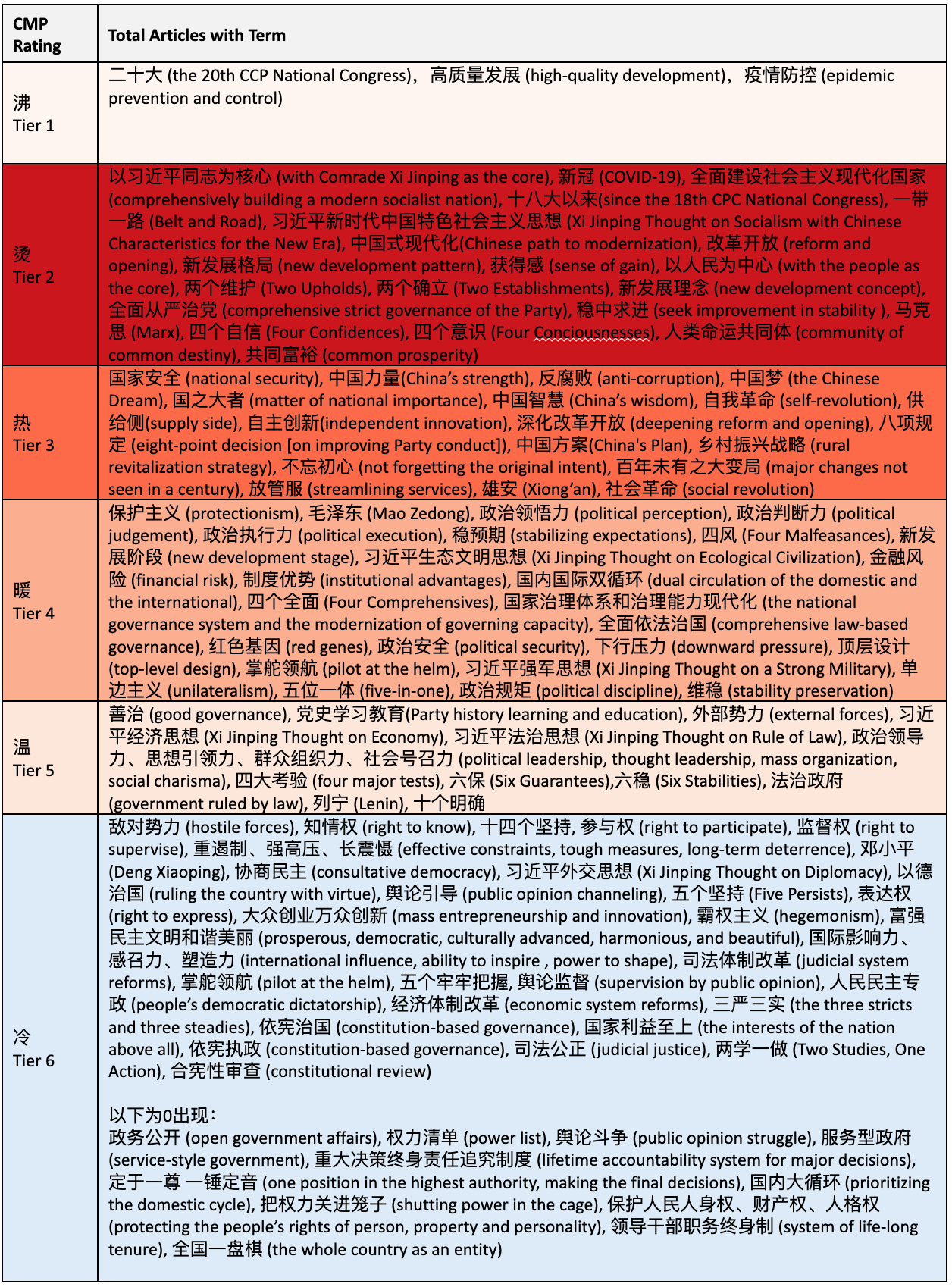
The Centrality Index
Just as in our December 2022 report, tallies of central leaders in the People’s Daily included both those from the 19th Central Committee and the 20th Central Committee. Keeping with practice throughout 2022, Xi Jinping was far and away the most mentioned leader in the CCP’s Central Committee in the pages of the People’s Daily. He remained at the white-hot top of the CMP scale in Tier 1, with a mention in 484 articles, though it is a moderate decline compared to the 700 recorded for last November — likely a result of the slight cooling of discourse intensity in the wake of the 20th National Congress.
Consistently in 2022 and 2021, all other central leaders were arrayed across Tier 3, 4 and 5, with only Premier Li Keqiang rising briefly into Tier 3. The intensity of Li’s mentions is nothing comparable to Xi’s. Xi was mentioned with more than 25 times the intensity in January 2023.
He Lifeng (何立峰) and Wang Yi (王毅), with 12 and 9 articles each, both experienced stronger coverage as a result of the frequent diplomatic engagements in January, including accompanying Xi Jinping to receive the visiting presidents of the Philippines and Turkmenistan. Wang Huning (王沪宁) was mentioned in 8 articles for the month for attending official meetings, including of the Central Commission for Discipline Inspection and the United Front Work Department.
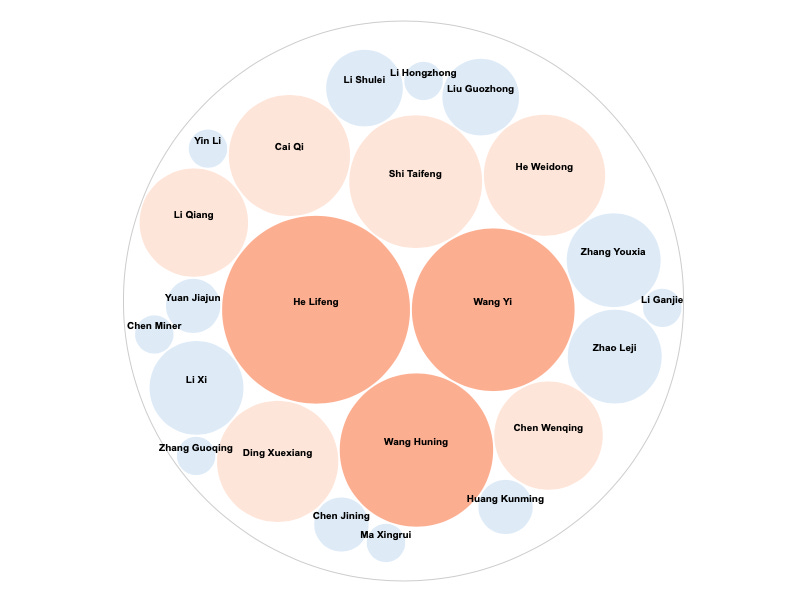
Foreign Leaders
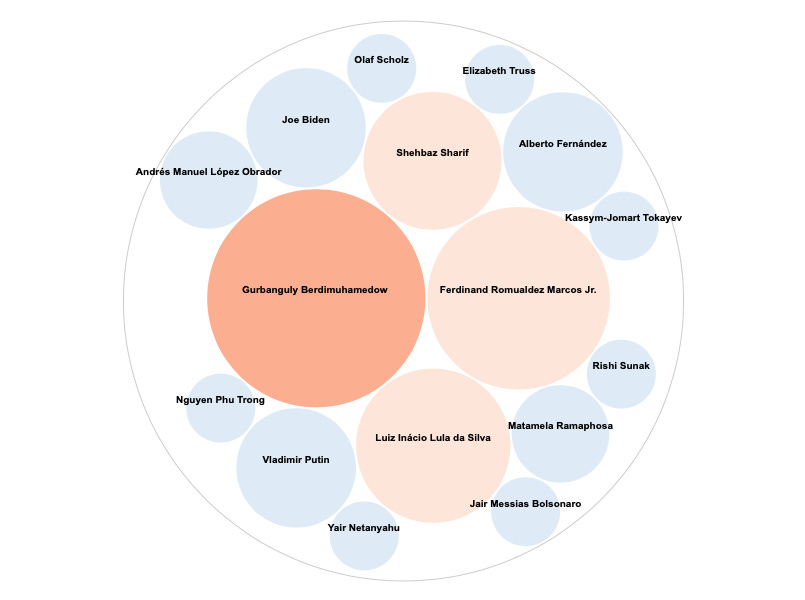
As was the case in December 2022, foreign leaders in the People’s Daily were arrayed across Tiers 4-6 in January 2023, with none appearing in Tiers 1-3. Serdar Berdimuhamedow, the president of Turkmenistan, who made an official visit to China at the start of the month, led the pack — a surprise upset of the two foreign leaders who generally top the list: Vladimir Putin and Joe Biden. Berdimuhamedow was the only leader to appear in Tier 4.
Second in running was Philippines President Ferdinand Marcos Jr., who also visited Beijing in January. Both leaders received relatively prominent coverage mainly because they fit into the strategy of the Belt and Road. Related reports talked about the “expansion of the friendship circle of the ‘Belt and Road’” (‘一带一路’朋友圈), and emphasized the upcoming 10-year anniversary of Xi’s signature foreign policy initiative. Xi Jinping first proposed the “new Silk Road” during a visit to Kazakhstan in early September 2013.
Also appearing in Tier 5 in January was the newly elected Brazilian President Luiz Inácio Lula da Silva (“Lula”). Notably, Xi Jinping sent a letter to Lula congratulating him on his election victory, and Wang Qishan attended the inauguration ceremony in Brasilia. Following Lula's election, thousands of supporters of former Brazilian President Bolsonaro forced their way into the Brazilian Congress, the Federal Supreme Court, and the Presidential Palace, among other government institutions, and clashed with MPs on January 8. On January 10, the People's Daily published a roundup from the official Xinhua News Agency summarizing the condemnation of the violence by a number of Latin American governments and regional organizations, as well as their support for Lula. Notes of condemnation came from the presidents of Argentina, Chile, Cuba, Uruguay, Ecuador, and Colombia.
Russian President Vladimir Putin appeared in Tier 6 with only three mentions in January 2023. However, it is worth remembering, as we noted at the outset of this report, that coverage of the New Year’s exchange between Putin and Xi appeared in the “newspaper eye” on the front page of the year’s first edition of the People’s Daily. Xi’s talk at the start of the year of “deepening comprehensive strategic cooperation and practical cooperation in various fields for the benefit of the two countries and their peoples” is worth bearing in mind as questions loom about China’s possible material support for Russia’s invasion of Ukraine.
Among the foreign leaders not mentioned at all in January were French President Emmanuel Macron, Canadian Prime Minister Justin Trudeau, and Ukrainian President Volodymyr Zelensky.



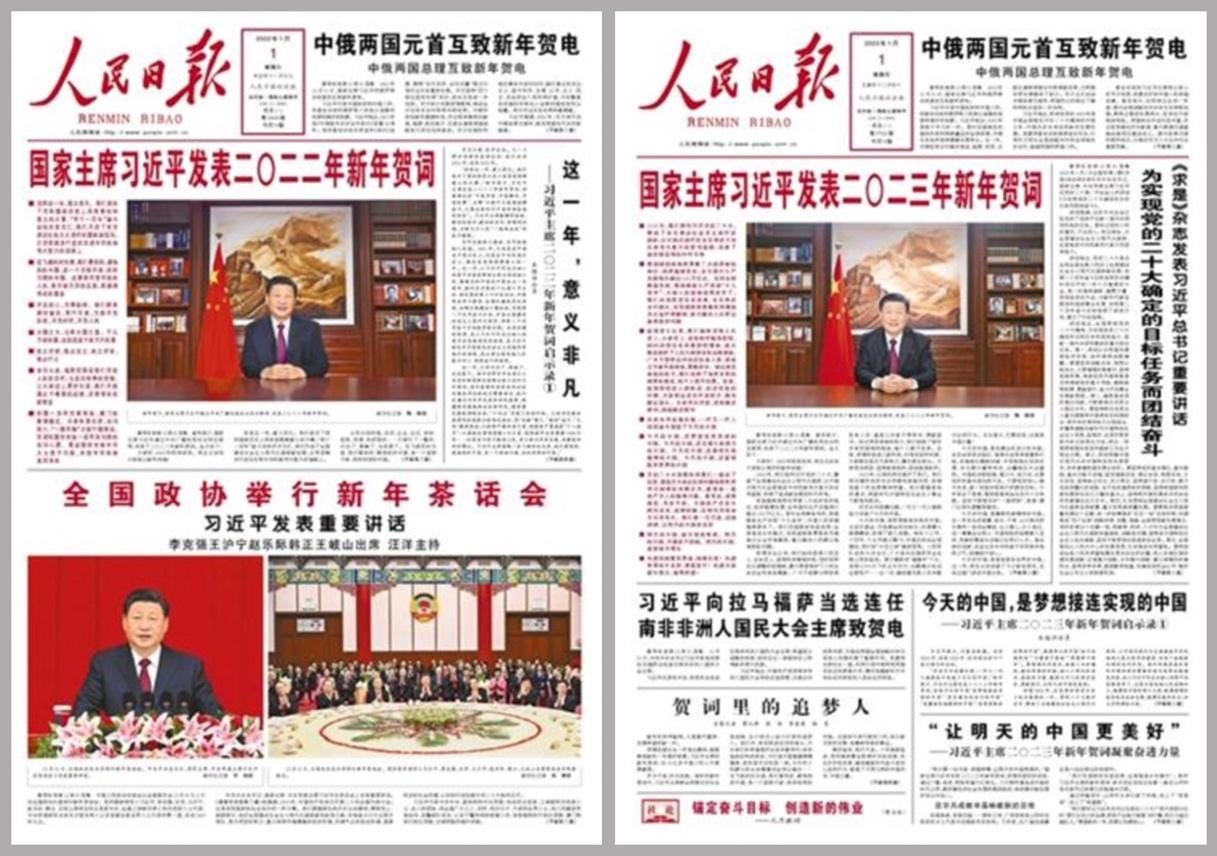
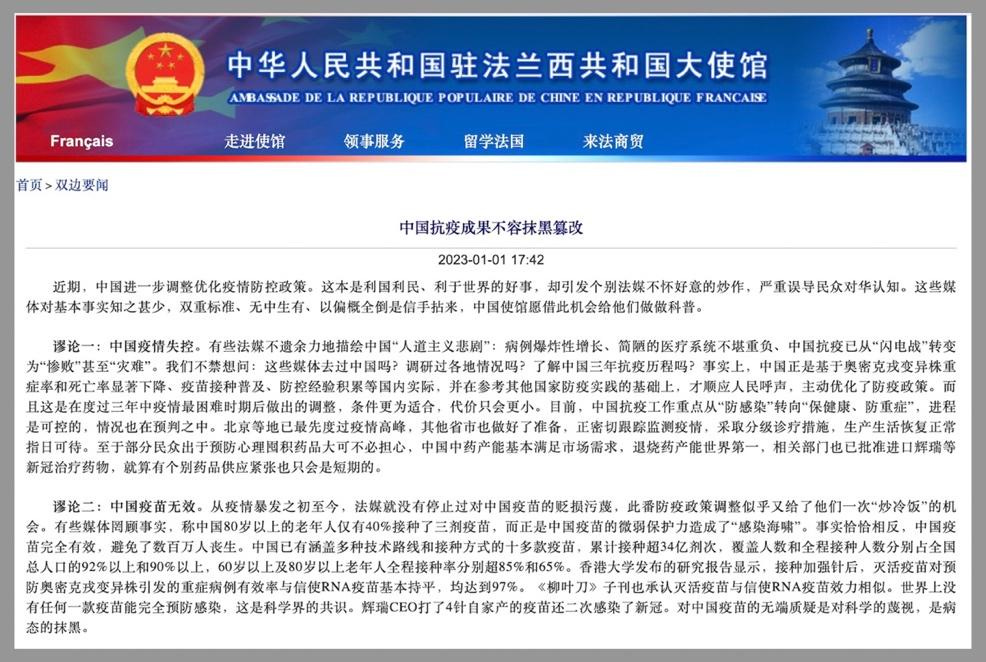
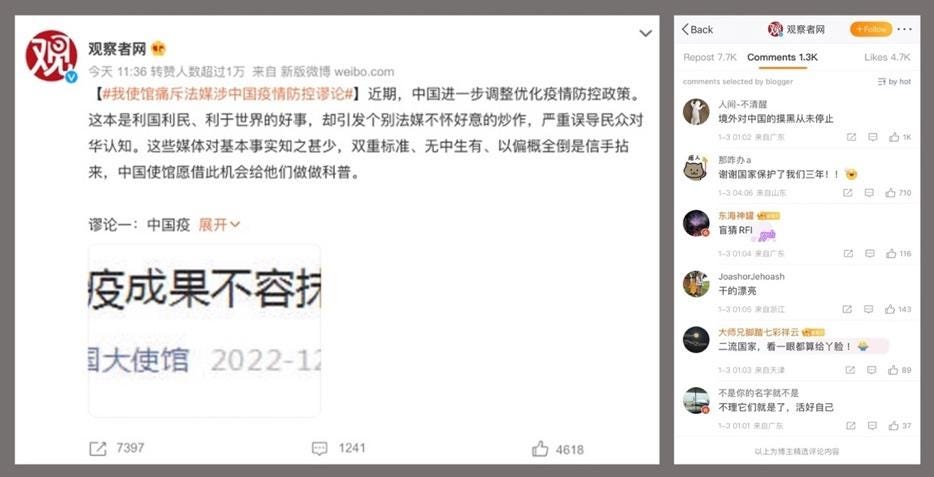
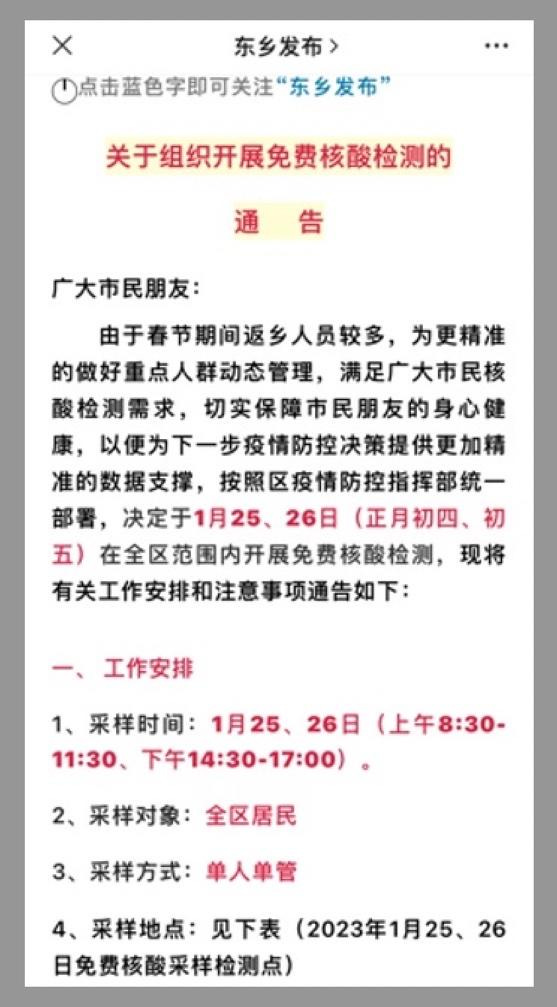
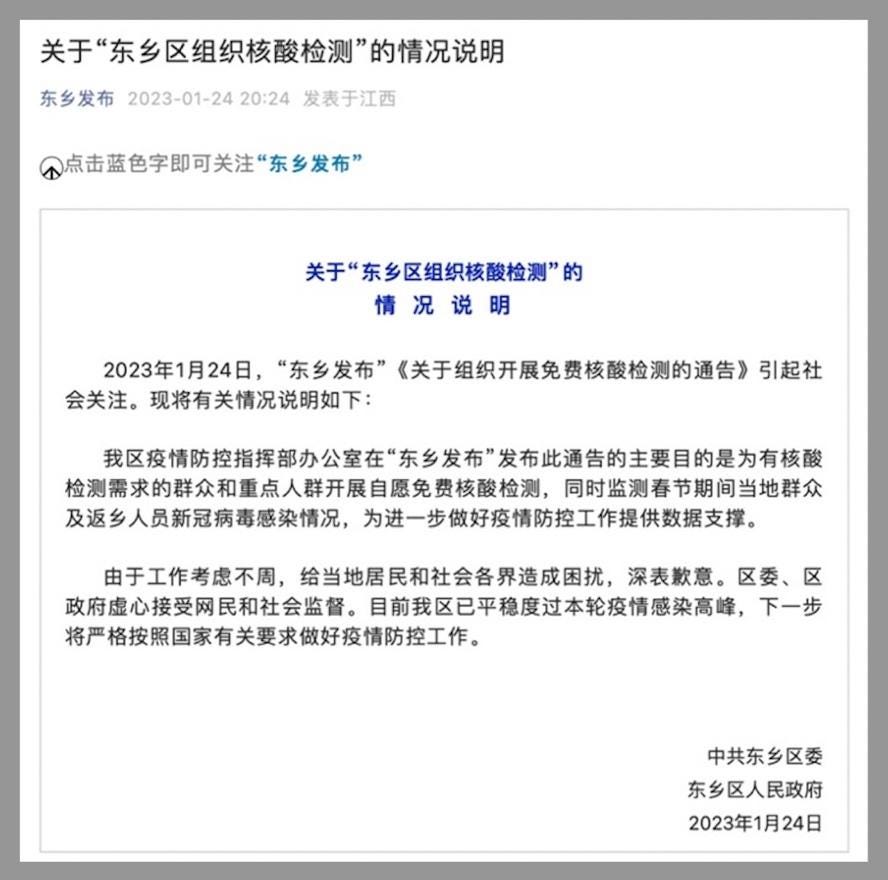
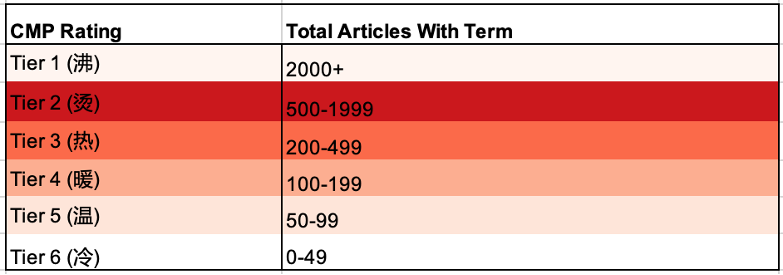
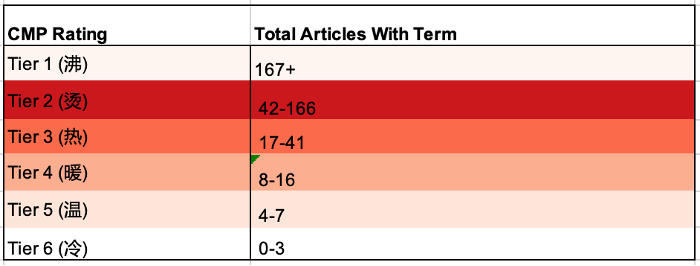
The education sector in China now includes such anodyne phrases as for the "rejuvenation of the country." My guess is for many students (and teachers) such words are sleep inducing, while others may actually think this.